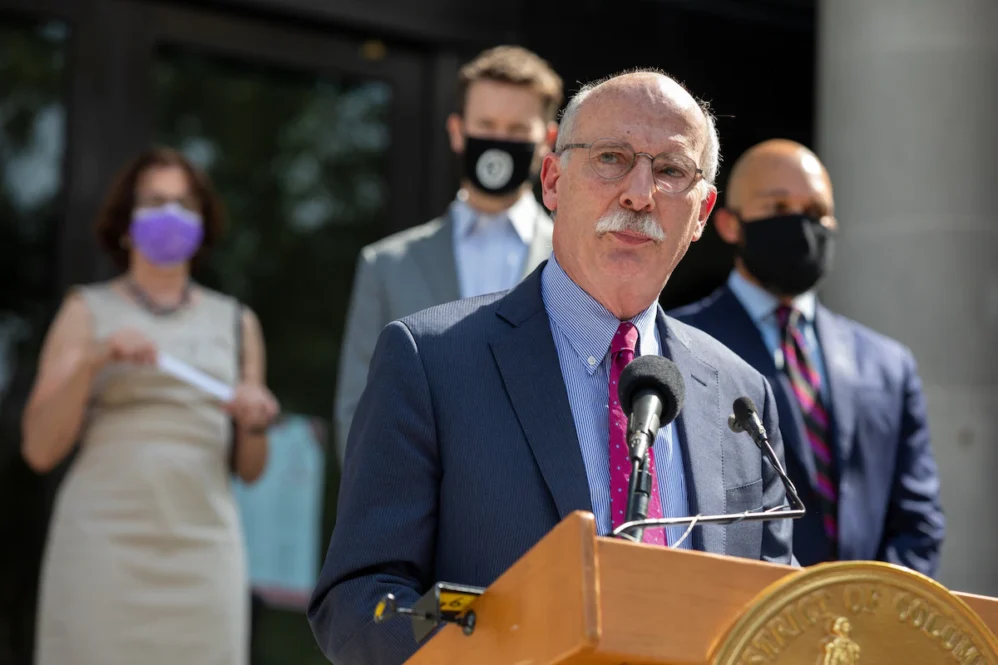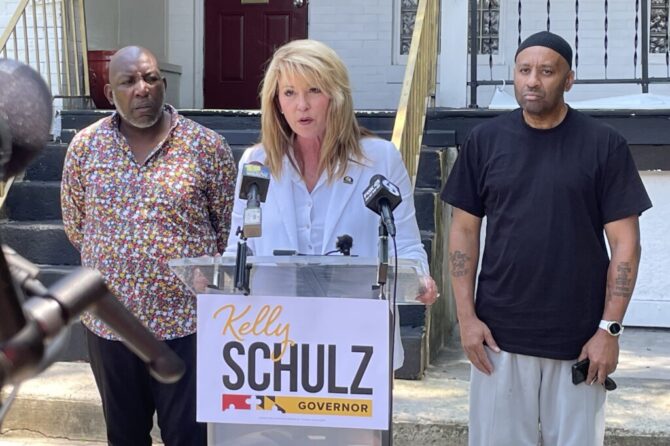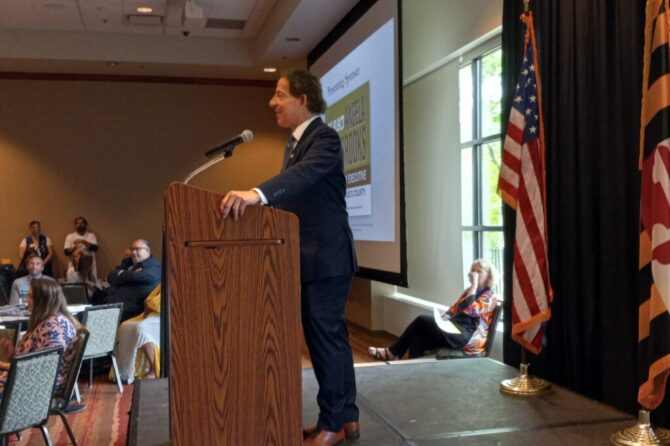WASHINGTON POST: Mendelson bill would direct D.C. mayor, police to launch new crime strategies. Council Chairman Phil Mendelson (D) introduced legislation Thursday that would launch on a pair of gun violence reduction strategies that national criminal justice experts recommended to the District more than a year ago — the latest legislative proposal in a year in which soaring violent crime put council members under pressure to show residents they are taking action.
Mendelson has long argued that legislation is not the sole solution to reducing crime and that police and the mayor’s office bear most of that responsibility. Now, his bill would order the executive to move forward with crime-fighting strategies that are largely already within the mayor and police department’s power. It is Mendelson’s most direct action on crime all year.
“The mayor talks about, ‘well, the council needs to do things.’ All right. So we’ve identified five different strategies with this bill, four of which the mayor can do, but she hasn’t. So we’ll legislate it,” Mendelson said.Mendelson’s bill would create a gun violence intervention initiative and take a new approach to blighted properties that attract crime, the two proposals that were part of recommendations made to the District last year. It would also seek to free up law enforcement officers by allowing D.C. police to hire civilians to investigate property crimes and cold cases.
It would gather and make public data on repeat violent offenders that Mendelson said he hoped could help illuminate breakdowns in the justice system. Lastly, it would allow the District to seek Medicaid reimbursement for community services often offered to those involved in or victimized by gun violence, leveraging federal funds.
Mendelson said his gun violence intervention initiative would involve a “focused deterrence” strategy intended to supplement existing programs. That strategy, modeled after others found to be successful in cities such as Boston, would be led by law enforcement officials who would target crime deterrence efforts on the relatively small percentage of repeat offenders responsible for a disproportionate amount of violent crime.
He said it is distinct from programs already in place such as interrupters, who are not law enforcement but people with lived experience who try to steer residents away from crime, and People of Promise, which does seek to identify people at risk of committing violence, although Mendelson questioned its effectiveness.
“Even though there has been talk about this for years, I have yet to see a focused deterrence strategy or focused deterrence approach in the District,” Mendelson said. “I think the District has been flailing at approaches toward reducing gun violence and not being as aggressive as they need to be with some of these strategies.”
A spokeswoman for Mayor Muriel E. Bowser’s office said the mayor’s team is reviewing Mendelson’s legislation but did not address Mendelson’s claims.
It’s unclear how Mendelson’s proposal would interact with existing programs. In May, Bowser (D) ordered a review of every violence intervention and gun violence prevention program in the District, with the goal of consolidating efforts into a more coordinated strategy and discarding ineffective approaches. The results of that review have yet to be released.
Mendelson said he did not consult with public safety officials or City Administrator Kevin Donahue, who is overseeing the review and has said about 100 violence-prevention-related initiatives, activities and programs have been identified across 20 agencies. Mendelson said he would seek feedback during future hearings.The bill’s new approach to addressing blight would target specific properties that attract crime and authorize the mayor to take corrective action at the property owner’s expense. The city has the ability to compel repairs at blighted properties, but Mendelson said “passive” approaches such as raising taxes on a property as a penalty for skipping ordered repairs do not produce the desired result.
“This adds an element that the property is criminal, then it gives the mayor authority to step in and abate the property as contributing toward criminal activity,” Mendelson said.
Mendelson drew the proposal, plus the gun violence intervention initiative, from a May 2022 violence reduction strategic plan that put forth ideas that have worked in jurisdictions nationwide. The report, from the National Institute of Criminal Justice Reform, was presented to the District but never fully implemented. It described D.C. as “lacking the political commitment, coordination, and a coherent strategy to reduce gun violence” — despite having the tools at its disposal to create one.“Watching these strategies not being implemented and knowing that they can make a difference, I’m fed up with the inaction,” Mendelson said.
Spokespeople for D.C. police did not immediately respond to a request for comment about the department’s position on the legislation, and a spokeswoman for the U.S. Attorney’s Office said the office had not been able to immediately review the bill and could not comment.
Mendelson’s plan joins a growing collection of legislative proposals aimed at increasing public safety in the city as a violent year comes to a close. D.C. is on track to have its worst homicide count since 1997, with 265 killings so far. While some including the police union continued to blame Mendelson for crime and reacted negatively to his proposal, others applauded it as a robust, targeted approach to tackle the violence.
The DC Justice Lab, a criminal justice reform advocacy group, said Mendelson’s bill — and other recent proposals such as the Whole of Government Response to Crime Act from Council member Robert C. White Jr. (D-At Large) — “provides a framework for the kind of transformative change that D.C. desperately needs.”
“By incorporating recommendations with a proven track record of success both here and in other jurisdictions, such as focused deterrence strategies, these bills acknowledge the complex nature of crime and the multifaceted approach required to address it effectively,” the organization said in a statement.
Mendelson for much of the year was besieged by what he called an unfair perception that the council “does not care” about crime, an accusation that had blared on the national stage after Mendelson told members of Congress in March that “there is not a crime crisis in Washington, D.C.”
The quote — reprised by the police union in its response to Mendelson on Thursday — became part of a year-long narrative suggesting Mendelson and his colleagues didn’t grasp the urgency of the crime problem. Lawmakers’ frustration reached a fever pitch in July when multiple council members, including Mendelson, said they were tired of that perception and were committed to responding. They then passed emergency legislation by a vote of 12-1 that expanded pretrial detention for those charged with violent crimes and created a new offense for firing a gun in public — then proceeded to introduce additional public safety bills this fall.
Council member Brooke Pinto (D-Ward 2), chair of the public safety committee, has put forth legislation that would increase penalties for gun crimes, require judges to issue written explanations if they release someone charged with a violent crime on bond, and — most controversially because of racial profiling concerns — allow police to perform random, warrantless searches on people who have been charged with or convicted of violent crimes.
White has proposed new staff positions to coordinate victim services and programs intended to provide rehabilitative services to young people; incentives to hire staff at the D.C. crime lab, although it remains unaccredited; and more granular firearms tracking data, among other things. Multiple members, including Pinto, White, Brianne K. Nadeau (D-Ward 1) and Charles Allen (D-Ward 6), have bills that would enhance staffing at the troubled 911 call center.
And another from Bowser, the Addressing Crime Trends Now Act, would create a new felony offense for “organized retail theft” and would revive a War on Drugs-era idea to create temporary “anti-loitering drug-free zones,” intended to disrupt open-air drug dealing, she has said. She is also urging the council to approve a broader, permanent version of the emergency crime legislation that passed over the summer, Bowser’s Safer Stronger Amendment Act.“
These strong anti-crime bills were written in partnership with residents and law enforcement to combat crime, ensure accountability and keep DC residents safe,” the mayor’s office said in a statement. “While our team continues to review the chairman’s legislation, the administration is calling on the Council to take immediate action to pass these critical pieces of legislation already before them.”










